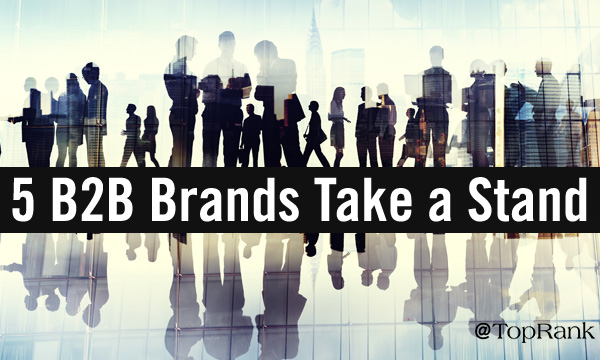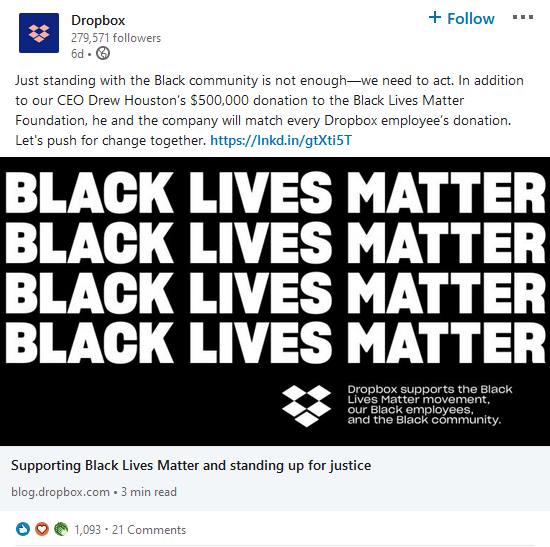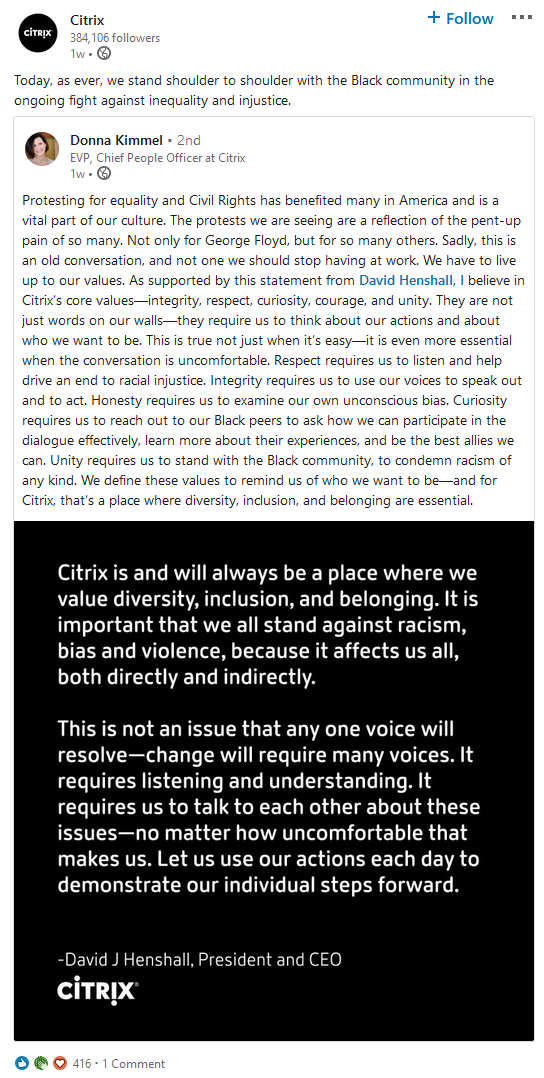
 It’s never been more important for brands to show purpose and to be connected to what’s important to customers. As our CEO Lee Odden recently observed in Marketers: We Can Do Better Than Words with Action, "We can all agree that there has to be a change and that we can all play a part in some way, large or small," a call to action that is being taken to heart by individuals and brands alike. Here are 5 examples of B2B brands making a difference today by going beyond words and taking action.
It’s never been more important for brands to show purpose and to be connected to what’s important to customers. As our CEO Lee Odden recently observed in Marketers: We Can Do Better Than Words with Action, "We can all agree that there has to be a change and that we can all play a part in some way, large or small," a call to action that is being taken to heart by individuals and brands alike. Here are 5 examples of B2B brands making a difference today by going beyond words and taking action.
1 - Microsoft United For Change
 Microsoft’s “United for Change” initiative was announced by company CEO Satya Nadella in an email to the firm’s employees, also made public in a post on its LinkedIn* page. “We all have a role to play. I will do the work. The company will do the work. I am asking each of you to do the work. And together, we will help make the difference we want to see in the world,” Nadella said, while offering solidarity and quarter million dollar donations to the Minnesota Freedom Fund, the Black Lives Matter Foundation, the Equal Justice Initiative, the Innocence Project, The Leadership Conference, and the NAACP Legal Defense & Education Fund. “We have to act. And our actions must reflect the values of our company and be directly informed by the needs of the Black and African American community,” Nadella urged. Microsoft has also publicly taken a stand and shared its purpose on the global health crisis front, from an extensive COVID-19 response resource page detailing numerous ways the company is taking action facing the pandemic, to special messaging on its social media profiles. “At Microsoft, we’re working to do our part by ensuring the safety of our employees, striving to protect the health and well-being of the communities in which we operate, and providing technology, tips, and resources to our customers to help them do their best work while remote,” the company shared front-and-center on its LinkedIn profile. Microsoft turned its pandemic-shuttered headquarters Commons dining facilities and re-purposed them into a hub that’s now made over 120,000 lunches for kids and families through programs including the Boys and Girls Clubs, YMCA, Hopelink, and Northwest Harvest — a move that also helps support the firm’s many local growers and food suppliers, using up to 65 Microsoft volunteers daily. Microsoft-owned LinkedIn also issued a strong statement of support for those calling for change, and followed up with action by making a series of LinkedIn Learning courses on diversity and inclusion available for free. The company is also sharing perspectives from Black employees on its various social media profiles, stating “Being a strong ally begins with listening, so we are sharing stories to amplify perspectives from the Black community.” [bctt tweet="“We have to act. And our actions must reflect the values of our company and be directly informed by the needs of the Black and African American community.” Microsoft CEO Satya Nadella @satyanadella" username="toprank"]
Microsoft’s “United for Change” initiative was announced by company CEO Satya Nadella in an email to the firm’s employees, also made public in a post on its LinkedIn* page. “We all have a role to play. I will do the work. The company will do the work. I am asking each of you to do the work. And together, we will help make the difference we want to see in the world,” Nadella said, while offering solidarity and quarter million dollar donations to the Minnesota Freedom Fund, the Black Lives Matter Foundation, the Equal Justice Initiative, the Innocence Project, The Leadership Conference, and the NAACP Legal Defense & Education Fund. “We have to act. And our actions must reflect the values of our company and be directly informed by the needs of the Black and African American community,” Nadella urged. Microsoft has also publicly taken a stand and shared its purpose on the global health crisis front, from an extensive COVID-19 response resource page detailing numerous ways the company is taking action facing the pandemic, to special messaging on its social media profiles. “At Microsoft, we’re working to do our part by ensuring the safety of our employees, striving to protect the health and well-being of the communities in which we operate, and providing technology, tips, and resources to our customers to help them do their best work while remote,” the company shared front-and-center on its LinkedIn profile. Microsoft turned its pandemic-shuttered headquarters Commons dining facilities and re-purposed them into a hub that’s now made over 120,000 lunches for kids and families through programs including the Boys and Girls Clubs, YMCA, Hopelink, and Northwest Harvest — a move that also helps support the firm’s many local growers and food suppliers, using up to 65 Microsoft volunteers daily. Microsoft-owned LinkedIn also issued a strong statement of support for those calling for change, and followed up with action by making a series of LinkedIn Learning courses on diversity and inclusion available for free. The company is also sharing perspectives from Black employees on its various social media profiles, stating “Being a strong ally begins with listening, so we are sharing stories to amplify perspectives from the Black community.” [bctt tweet="“We have to act. And our actions must reflect the values of our company and be directly informed by the needs of the Black and African American community.” Microsoft CEO Satya Nadella @satyanadella" username="toprank"]
2 - IBM Emb(race)
 IBM CEO Arvind Krishna sent a letter to Congress on June 8th with a strongly worded offer to work with the Senate and House of Representatives on three key policy areas:
IBM CEO Arvind Krishna sent a letter to Congress on June 8th with a strongly worded offer to work with the Senate and House of Representatives on three key policy areas:
- Police reform
- Responsible technology policies
- Expanding opportunities
3 - Dropbox Black Lives Matter
 Dropbox CEO Drew Houston donated $500,000 to the Black Lives Matter Foundation, praising that organization’s “direct work to eliminate violence and systemic violence against Black people.” He also pledged to match every donation made by a Dropboxer in June to the BLM Foundation, the NAACP Legal Defense and Educational Fund, and the National Urban League. Dropbox has held Town Halls to address issues of racial inequality, and to explore actionable ways individuals can be part of a solution. The company also took a half day pause on June 5th so employees could volunteer, read, and reflect on recent events.
Dropbox CEO Drew Houston donated $500,000 to the Black Lives Matter Foundation, praising that organization’s “direct work to eliminate violence and systemic violence against Black people.” He also pledged to match every donation made by a Dropboxer in June to the BLM Foundation, the NAACP Legal Defense and Educational Fund, and the National Urban League. Dropbox has held Town Halls to address issues of racial inequality, and to explore actionable ways individuals can be part of a solution. The company also took a half day pause on June 5th so employees could volunteer, read, and reflect on recent events.
4 - HP Leading With Values
 HP has offered up a number of initiatives that focus on turning listening efforts into action for the entirety of the organization, and has also explored how companies can best take this opportunity to build sustainable and scalable future movements. "Don't mistake good communication for action," Karen Kahn, HP's chief brand and communications officer recently said. "There is a really big difference. Writing well on behalf of our companies and executives is very different from corporate policies, procedures and actions on behalf of our brands," Kahn observed. Kahn and Lesley Slaton Brown, HP's chief diversity officer, explored a variety of ways HP is going beyond communication into the realm of action in a recent hour-plus interview with Aarti Shah, executive editor at Provoke. By opening up the core values of the company, HP reminds both employees and customers what the company stands for — at a time today when brand purpose is likely more vital than ever before. [bctt tweet="“Don't mistake good communication for action. There is a really big difference.” Karen Kahn of @HP" username="toprank"]
HP has offered up a number of initiatives that focus on turning listening efforts into action for the entirety of the organization, and has also explored how companies can best take this opportunity to build sustainable and scalable future movements. "Don't mistake good communication for action," Karen Kahn, HP's chief brand and communications officer recently said. "There is a really big difference. Writing well on behalf of our companies and executives is very different from corporate policies, procedures and actions on behalf of our brands," Kahn observed. Kahn and Lesley Slaton Brown, HP's chief diversity officer, explored a variety of ways HP is going beyond communication into the realm of action in a recent hour-plus interview with Aarti Shah, executive editor at Provoke. By opening up the core values of the company, HP reminds both employees and customers what the company stands for — at a time today when brand purpose is likely more vital than ever before. [bctt tweet="“Don't mistake good communication for action. There is a really big difference.” Karen Kahn of @HP" username="toprank"]
5 - Citrix
 In addition to a variety of diversity programs outlined recently by CEO David J. Henshall and on the firm's "You Below at Citrix" page, Citrix has presented a multi-tiered approach to taking action in light of the global health crisis, including $17 million to support communities, doubling up on the company's employee matching charitable donations to COVID-19 related causes, and two new paid days off annually for employees to volunteer and the non-profit of their choice, including new virtual volunteering options. During the pandemic Citrix has also expanded its partnership with the Girls Who Code program, including matching donations from employees, customers, and other partners in an effort to continue paving the way to a more equal and empowered future for the project, with new "Code at Home" activities for millions of students and educators while schools remain closed. Citrix's COVID-19 resource page includes statements from Henshall, plus a variety of helpful resources for customers wishing to take action.
In addition to a variety of diversity programs outlined recently by CEO David J. Henshall and on the firm's "You Below at Citrix" page, Citrix has presented a multi-tiered approach to taking action in light of the global health crisis, including $17 million to support communities, doubling up on the company's employee matching charitable donations to COVID-19 related causes, and two new paid days off annually for employees to volunteer and the non-profit of their choice, including new virtual volunteering options. During the pandemic Citrix has also expanded its partnership with the Girls Who Code program, including matching donations from employees, customers, and other partners in an effort to continue paving the way to a more equal and empowered future for the project, with new "Code at Home" activities for millions of students and educators while schools remain closed. Citrix's COVID-19 resource page includes statements from Henshall, plus a variety of helpful resources for customers wishing to take action.
B2B Brands Benefit From Showing Purpose Now More Than Ever
Now more than ever it's important for brands to have and actionably demonstrate purpose, and to be connected to what’s important to customers. The examples we've looked at from Microsoft, IBM, Dropbox, HP, and Citrix show a small sample of how brands are going beyond words and taking action, and we hope they will serve to inspire you to move beyond words in both your professional and personal lives. * LinkedIn is a TopRank Marketing client.The post B2B Brands Take a Stand: 5 Examples of Going Beyond Words to Action appeared first on Online Marketing Blog - TopRank®.
from Online Marketing Blog – TopRank® https://ift.tt/3dRdSY2
via IFTTT
